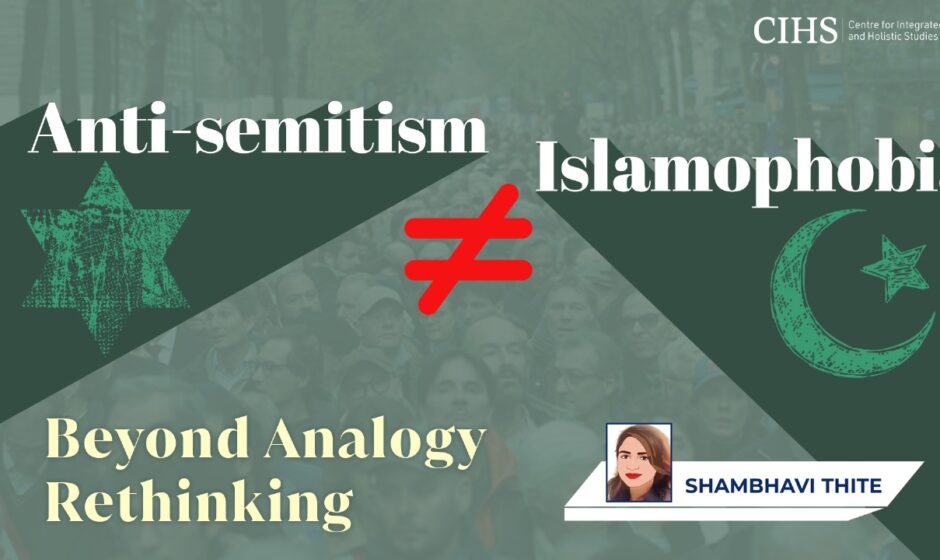Shambhavi Thite
In recent years, there has been a growing effort to portray Islamophobia and anti-semitism as synonymous forms of prejudice. Though well-meaning, this analogy ignores their quite different histories, intentions, and outcomes. Not only another type of prejudice, anti-semitism is a centuries-old hatred spun into the fabric of Western and Middle Eastern civilizations by religious demonisation, economic conspiracies, and violent scapegoating.

From medieval blood libels to the Holocaust, Jews have been persecuted for who they are—a people wrongly accused of dominating media, banks, and governments not for anything they have done. Though equally destructive in its consequences, Islamophobia usually results from modern geopolitical concerns, security fears, and responses to radicalism. Understanding these differences is essential—not to rank suffering but rather to face every type of hate with the historical and contextual knowledge it requires.
While a major problem, Islamophobia usually results from geopolitical conflicts, terrorism, and radical Islamist movements rather than from a basic theological hate. Major Islamist terror events like 9/11 and later acts of violence by groups like ISIS and Al-Qaeda have been intimately associated with the rise of anti-Muslim attitudes in many Western countries. Unlike anti-semitism, which presents Jews as all-powerful conspirators, Islamophobia is mostly molded by security concerns and cultural anxiety rather than a natural, unprovoked animosity against Muslims. While anti-Muslim discrimination should be categorically denounced, conflating it with anti-semitism obscures the unique challenges faced by Jewish communities. It disregards the specific historical and ideological sources of every type of discrimination.
Anti-semitism: A Constant, Systemic Hatred
For millennia, anti-semitism has been ingrained in religious, political, and economic machinations that have excluded and attacked Jewish populations all over. From medieval blood libels and the Spanish Inquisition to the Dreyfus Affair and the Holocaust, Jews have been unfairly accused of dictating media, financial organizations, and international governments. As shown by the emergence of online hate speech targeting Jews following the October 7 Hamas attack on Israel, these conspiracy theories still feed current anti-semitism (The New York Times).
Clear expression of modern anti-semitism is the continuous brutality against Israeli people by Hamas, including intentional killing, kidnapping, and torture of men, women, and children. These crimes are rooted in a strongly ingrained worldview that denigrates Jewish people and rejects the validity of Jewish sovereignty; therefore, they transcend political or territorial boundaries. While ostensibly separating Jews from Zionists, Hamas’s 2017 charter has often spread antisemitic discourse based on historical clichés of Jewish conspiratorialism and cruelty. Targeting citizens—a breach of international law—reflects an ideological dedication to the destruction of Israel, which functions as a front for the more general denial of Jewish self-determination. This violence must be viewed in the context of anti-semitism, which has historically justified the persecution of Jews through group guilt and demonization. The reaction of the world community to these crimes will be a crucial test of whether anti-semitism is actually given the same importance as other kinds of racial and ethnic hatred.
Moreover, anti-semitism results from ideas of a far right or white supremacist nature as well. However, extremist Islamist rhetoric also plays a significant role. For decades, Islamist parties like the Muslim Brotherhood have spread antisemitic tales linking Jews to malevolent conspirators running worldwide affairs (Fathom Journal). Independent of the Israeli-Palestinian conflict, this enmity toward Jews highlights even more how anti-semitism is a hate-driven ideology rather than a response to political events.
Anxiety About Radical Islamism: Reversing Extremism
Although sincere anti-Muslim discrimination ought to be denounced, most of what is labelled as “Islamophobia” nowadays results from a response to radical Islamism and extreme violence rather than from a natural hostility against Muslims. Unlike anti-semitism, which has historically attacked Jews regardless of their beliefs or behaviour, modern animosity toward Islam is often motivated by issues connected to terrorism, the application of Sharia law, and the larger sociopolitical influence of Islamist extremism. Contextual analysis is necessary to grasp the different historical paths and society reactions to these two kinds of discrimination since this difference defines them.
High-profile Islamist terror acts, including 9/11, the Charlie Hebdo murder, and the Manchester Arena bombing, have mostly coincided with the explosion in Islamophobia across Western countries. Along with organizational actions like Al-Qaeda and ISIS, these events have stoked public fears about radical Islam. Prejudice of any kind is disgusting, but dismissing these problems as mere bigotry fails to recognize the actual security risks posed by radical groups. Jews have historically faced persecution regardless of their behaviour. On the other hand, most of the hostility directed at Muslims in the West results from concerns about Islamist extremism rather than from a general contempt of the religion itself (The Jerusalem Post). Encouragement of serious debates on religious tolerance, security, and the complexity of modern global politics depends on an awareness of this vital difference.
The term “Islamophobia” is misused in the suppression of Islamist extremism criticism
The fact that the modern “Islamophobia” story is so often used as a weapon to stifle reasonable criticism of radical Islam raises some very alarming questions. While it’s vital to combat real anti-Muslim bias, the term Islamophobia is increasingly used to silence discussions about Islamist ideology and its intellectual roots. This misreading of religious tolerance and security shapes the conversation such that even well-founded criticisms of extreme ideas are written off as bigotry.
One prominent illustration of this phenomenon is the way detractors of the Boycott, Divestment, and Sanctions (BDS) movement against Israel are sometimes accused of Islamophobia. Rooted in a mix of Islamist and far-left activity, the BDS movement aims to minimize the Jewish state under the cover of human rights campaigning. But resistance to BDS is a reaction to a political objective that fits parties renowned for their animosity toward Israel and, at times, Jews in general, not a statement of anti-Muslim feeling. Combining Islamophobia with BDS compromises free speech by deterring honest discussion on the consequences of the movement (The Conversation).
This more general trend of characterizing any criticism of Islamist militancy as Islamophobic has alarming results. It discourages attempts to properly fight extremism by preventing productive debates on the dangers presented by radical Islamist movements. Moreover, it hides the important difference between legitimate security concerns regarding radicalization and discrimination against Muslims as a religious group. A meaningful conversation upholding free speech and the struggle against discrimination depends on an awareness of this disparity. Societies can better handle the issues presented by radical Islamism by letting debates on it be free from unjustified charges of discrimination, so safeguarding the rights of every person, including moderate Muslims who reject extremist ideas.
“Two Sides of the Same Coin”: Why Conceptually Flawed is the Equivalence of Anti-semitism and Islamophobia
The claim that Islamophobia and anti-semitism are the same ignores the basic contrasts between these two separate events. For millennia, anti-semitism—a deeply ingrained and illogical kind of hate—has driven systematic persecution of Jewish populations, pogroms, and extermination. Often appearing in conspiracy narratives that show Jews as having disproportionate impact over world affairs, banking, and politics, it is an ideological construct that exists apart from Jewish activities or behaviour. From medieval expulsions to the horrors of the Holocaust, this kind of bigotry has been a main excuse for extensive persecution.
Conversely, as most describe it, Islamophobia is frequently a response to radical Islamism rather than a baseless or historically rooted hostility toward Muslims generally. Although anti-Muslim prejudice surely exists and has to be fought, most of what is labelled as Islamophobia nowadays results from worries about Islamist extremism, Sharia law, and the consequences of radicalization for society. Unlike anti-semitism, which is based on long-standing conspiratorial notions about Jewish control, antipathy toward Islam is often connected to security concerns following events including the 9/11 attacks, the establishment of ISIS, and many Islamist terror occurrences across the West. The difference is important: whereas Islamophobia, in its contemporary form, usually emerges in response to particular geopolitical and security risks rather than an inherent prejudice against Muslim individuals or groups, anti-semitism attacks Jews regardless of their beliefs or behaviour.
Combining these two different kinds of discrimination throws off the debate on both problems. By equating anti-semitism with Islamophobia, one risks trivializing the deep-rooted, systematic hate that Jewish people have endured throughout history and, consequently, discounting reasonable concerns about the growth of Islamist extremism. This false equivalency can have major repercussions since it frames anti-semitism as only one component of a more general anti-religious prejudice instead of acknowledging its distinctive historical trajectory, which undermines efforts to combat anti-semitism. Moreover, it suppresses important conversations on national security and radicalization by characterizing reasonable criticisms of Islamist ideas as only manifestations of discrimination.
Despite their frequent overlap, Islamophobia and anti-semitism have distinct origins and roles in global society. Anti-semitism, an ancient and deeply ingrained form of hatred, continues to pose a significant threat to Jewish populations worldwide. Simultaneously, Islamophobia—often a response to extreme ideas rather than an unquenchable prejudice—is becoming more and more prevalent. When Westerners attempt to combine these two problems, they fail to understand them both effectively. Acknowledging the particular difficulties presented by Islamophobia and anti-semitism individually will help us to fight discrimination without skews of political reality.
(Author is a doctoral fellow at Jawaharlal Nehru University, specializes in inner asia with a research focus on inner asian politics spanning the last five years.)



